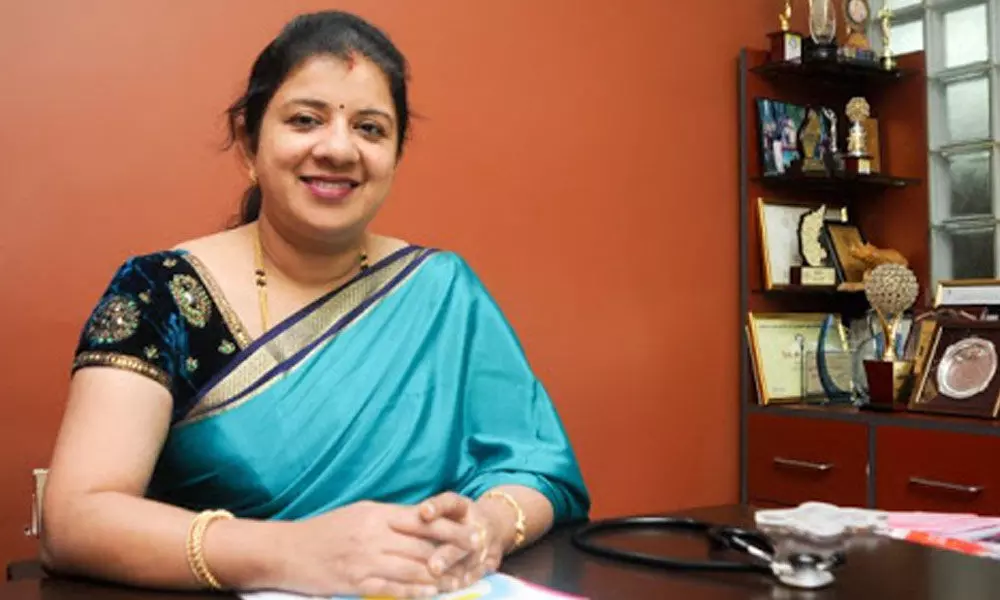Live
- Seven-day national mourning in respect of Dr. Manmohan Singh
- 'I've lost a mentor and guide': Rahul Gandhi grieves demise of Dr. Manmohan Singh
- 'Great loss for all of us': President Droupadi Murmu mourns Manmohan Singh's demise
- Dr Singh presented milestone budget of 1991 which liberalised Indian economy: FM Sitharaman
- PM Modi condoles demise of Dr. Manmohan Singh
- Former Prime Minister Manmohan Singh Dies at 92: A Legacy of Economic Reforms
- Nagesh Trophy: Telangana, Gujarat dominate action on Day 4 with easy wins
- Get Ready for Dreame Technology’s Year-End Amazon Sale – Big Savings on Smart Home Products
- FIR registered as 4 voter forgery cases come to light in Delhi's Okhla constituency
- Ayodhya Ram temple to host majestic anniversary celebrations on Jan 11 with devotional, cultural programmes
Just In
Endometriosis emerges as major reproductive disorder among over 25% women in India


Dr Vidya V Bhat, Gynaecologist and IVF specialist
Endometriosis, a debilitating female reproductive disorder, has emerged as a leading cause of infertility among women in Karnataka and a significant public health concern
Bengaluru: Endometriosis, a debilitating female reproductive disorder, has emerged as a leading cause of infertility among women in Karnataka and a significant public health concern. Prevalence of endometriosis may be as high as 25% to 40% among infertile women. About 25 million women are estimated to be suffering from endometriosis in India.
Renowned gynaecologist and IVF specialist Dr Vidya V Bhat, Medical Director, RadhaKrishna Hospital, said that the incidence in Karnataka has been reported to be as high as 44% in asymptomatic women undergoing laparoscopy for non-gynaecological symptoms.
Endometriosis is a condition in which the tissue that forms the lining of the uterus starts growing outside in other areas of the body like ovaries, abdominal cavity, urinary bladder and pelvis. This causes infertility and severe pain. Tissue growing into the rectum and bowel produces constipation or diarrhoea. If it grows into the ovaries or fallopian tubes, it causes infertility. If it grows within the vagina and rear of the uterus, it causes painful sexual intercourse. The disorder also leads to inflammation, causing abdominal pain and bloating.
Talking about the causes of endometriosis, Bhat elaborated, "Endometriosis is an estrogen-dependent disease, meaning that it thrives off estrogen. It has been linked to estrogen dominance, a condition where estrogen levels are out of balance with progesterone. This can occur from excess estrogen or low levels of progesterone, or both."
Estimates of incidence of endometriosis range up to 10% among the general population, 0.5% to 5% among fertile women, and 25% to 40% in infertile women. The average age at diagnosis of endometriosis is 28 years, with risk increasing beyond 30 years and peaking at early to mid-40 years.
Bhat said, "The exact prevalence of endometriosis is difficult to estimate, as many cases go undiagnosed, and the diagnosis requires invasive testing. About 25 million women are estimated to be suffering from endometriosis in India. Its prevalence is highest in the coastal regions, especially Kerala and West Bengal. The incidence in Karnataka has been reported to be as high as 44% in asymptomatic women undergoing laparoscopy for non-gynaecological symptoms. The disease is known to be present in families. A woman with a mother or sister with endometriosis is six times more likely to develop endometriosis compared to others."
The most common symptom of endometriosis is pelvic pain. Patients suffer from painful periods (especially sharp stabbing pain during the first couple of days), painful sex, pain while urinating, and constipation and bloating. "In many cases, it can take up to 10 years for symptoms of endometriosis to develop. This is extremely alarming since this disease is one of the main reasons why women become infertile. As symptoms of endometriosis are general and not specific, diagnosis is typically delayed by many years. Many patients come for treatment in advanced stages when there is complete distortion of the anatomy, making conception a big challenge."
The health implications of endometriosis are immense. According to Bhat, endometriosis affects the emotional well-being and physical health of women, with symptoms like pelvic pain, sexual dysfunction, menstrual irregularities and infertility. Patients have an increased risk of developing ovarian cancer.
"Pregnant women with endometriosis face the highest risk of premature birth and need special care. They are also more frequently scheduled for caesarean section due to placental complications. Endometriosis is diagnosed by ultrasound, transvaginal scans and MRI. It can be treated medically or surgically. In advanced stages, the surgical option is the best. Laparoscopic surgery is the gold standard for the treatment of endometriosis. Unfortunately, the recurrence of this disease is a big challenge. It comes back in as many as 50-70% of patients even after surgery. Such patients are put on long-term medical therapy to prevent recurrence. Repeated surgery should be avoided as it destroys the ovaries," she added.

© 2024 Hyderabad Media House Limited/The Hans India. All rights reserved. Powered by hocalwire.com






